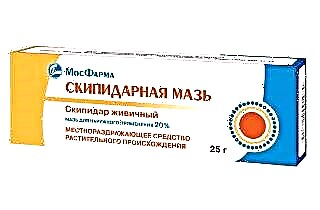During gestation (gestation), hormonal changes take place in the female body, which affects the functioning of the immune system. Due to a decrease in general immunity, about 1/3 of expectant mothers are faced with inflammation of the nasopharynx of an infectious or allergic origin. A nasal spray for a cold for pregnant women can eliminate local manifestations of the disease and speed up recovery. It should be remembered that almost all local drugs have only a symptomatic effect.
 Rhinorrhea (a profuse discharge of mucus), nasal congestion and sneezing are symptoms that accompany the development of many respiratory diseases. It is possible to eliminate unpleasant manifestations by means of aerosol preparations. But when choosing a nasal spray for pregnant women, you need to take into account several nuances: the composition of the medicine, the gestational period and the presence of individual intolerance. Ignoring the main criteria for the choice of medicines can lead to disturbances in the intrauterine development of the fetus, deterioration of well-being and complications.
Rhinorrhea (a profuse discharge of mucus), nasal congestion and sneezing are symptoms that accompany the development of many respiratory diseases. It is possible to eliminate unpleasant manifestations by means of aerosol preparations. But when choosing a nasal spray for pregnant women, you need to take into account several nuances: the composition of the medicine, the gestational period and the presence of individual intolerance. Ignoring the main criteria for the choice of medicines can lead to disturbances in the intrauterine development of the fetus, deterioration of well-being and complications.
How to choose a spray?
The use of sprays during pregnancy will be justified only if the benefits of their use outweigh the potential harm that the active components of the drugs can cause to the intrauterine development of the fetus. Unfortunately, modern pharmaceuticals are not able to offer special nasal products for pregnant women, but among the existing drugs there are still those that can be classified as safe.
When buying an aerosol, it is necessary to be guided not by personal preferences or the recommendations of friends, but by the main criteria for choosing effective and safe sprays. To prevent violations in the intrauterine development of the child, it is advisable to take into account the following factors:
- The gestational period. In the first trimester of pregnancy, it is impossible to use potent drugs, since the risk of complications in the fetus during this period is the highest. In the first months of intrauterine development, vital organs are laid. Inappropriate use of aerosols with synthetic substances and antibiotics can lead to developmental disabilities and congenital diseases;
- Composition of the medicine. The antibacterial, hormonal and vasoconstrictor substances contained in the sprays can cross the placental barrier and, accordingly, affect the development of the fetus. Permitted topical preparations include sprays, the active ingredients of which practically do not penetrate the bloodstream;
- The presence of individual intolerance. During pregnancy, the immune system malfunctions, therefore, it is during this period that the female body acquires an increased sensitivity to drugs and foods with a high degree of allergenicity.
 The synthetic steroid hormones found in glucocorticosteroid sprays can trigger unwanted allergic reactions. Therefore, during gestation, they should be used with caution and only as directed by a doctor.
The synthetic steroid hormones found in glucocorticosteroid sprays can trigger unwanted allergic reactions. Therefore, during gestation, they should be used with caution and only as directed by a doctor.
The use of nasal sprays is justified only in case of persistent violation of nasal breathing, allergic, viral or bacterial rhinitis.
If a cold occurs without severe symptoms, it is recommended to stay in bed for 3-4 days. To reduce the viscosity of mucus in the nasal cavity and facilitate its release, you should ventilate the room at least 2 times a day and humidify the air with sprayers. Rinsing the nose with salt water or saline will not be superfluous.
List of approved drugs
Spray from the common cold during pregnancy is used as a symptomatic drug. It should be understood that any means for intranasal use act locally and do not destroy the infection throughout the body. However, it is aerosols that are most often used to relieve the symptoms of rhinorrhea. During the injection of the drug, a finely dispersed liquid penetrates into the paranasal sinuses, which prevents the development of severe complications - sphenoiditis, maxillitis, etc.
Moisturizers
What aerosols can I use in the first weeks of pregnancy? The first three months of gestation are considered the most unfavorable for the use of medicines. Overdose of drugs and allergic reactions can aggravate the state of health, which negatively affects the intrauterine development of the child.
Moisturizing sprays with seawater are the safest anti-edematous, mucolytic and anti-inflammatory drugs. Unlike other nasal products, they contain only sea or ocean water, trace elements and herbal ingredients. The moisturizing spray can be used to treat colds of any nature - viral, microbial, fungal, allergic, etc.
Some of the most effective aerosols for pregnant women include:
- Physiomer;
- "Quicks";
- "No-Salt";
- Otrivin More;
- Aqua Maris;
- Morenazal.
You can also use a moisturizing nasal spray for pregnant women as a preparation for rinsing the nasopharynx. To clear mucus from the respiratory tract, you need to insert a nebulizer into the nostril and press the dispenser. After that, the liquefied mucus is blown out through the nose and the second nostril is similarly cleansed.
After washing, it is undesirable to go outside for 30-40 minutes, as this can lead to local hypothermia and the development of sinusitis.
Homeopathic remedies
Homeopathic aerosol is the best cold remedy with immunostimulating and regenerating properties. The composition of nasal preparations consists mainly of minerals, herbal ingredients and vitamins. It should be noted right away that they do not have an immediate effect, since they do not contain vasoconstrictor substances.
The therapeutic effect of homeopathic medicines has not been confirmed by clinical trials. But in practice, it is this category of local drugs that promotes tissue regeneration in the nasopharynx, increases local immunity and relieves rhinorrhea symptoms. Eliminate rhinitis during pregnancy will help:
- Delufen spray;
- "Asinis";
- Euphorbium Compositum;
- Rinitol;
- Edas-117.
According to experts, homeopathic medicines work in a placebo regimen. However, their use stimulates the immune system to fight off viral infections.
Decongestants
Vasoconstrictor sprays for the common cold are among the potentially dangerous drugs, since in case of an overdose, they have a systemic effect on the body.
 They contain stimulants of adrenergic receptors, which are located in the vessels of the nasopharynx. The use of decongestants promotes the narrowing of blood capillaries and the outflow of intercellular fluid from the affected tissues. Due to this, the patency of the nasal passages is restored, and nasal congestion disappears.
They contain stimulants of adrenergic receptors, which are located in the vessels of the nasopharynx. The use of decongestants promotes the narrowing of blood capillaries and the outflow of intercellular fluid from the affected tissues. Due to this, the patency of the nasal passages is restored, and nasal congestion disappears.
Vasoconstrictor sprays are recommended for use only in the second trimester of pregnancy. Approved drugs include:
- Rinotays 0.1%;
- "Tizin Xylo";
- Sanorin;
- "Naphtizin".
During pregnancy, it is impossible to use drugs that contain oxymetazoline ("Fazin", "Dlyanos", "Xymelin").
Some stimulants of adrenergic receptors (oxymetazoline, phenylephrine) are absorbed through the nasal mucosa into the bloodstream and cause vasospasm in the placenta.Subsequent disturbance of uteroplacental blood flow can lead to oxygen starvation of the fetus and, as a result, brain damage.
Allergy medications
Rhinoconjunctivitis and allergic rhinitis are autoimmune diseases that are accompanied by severe swelling of the nasopharynx and impaired nasal breathing. The danger of allergies is that swelling of the mucous membrane leads to blockage of the airways that connect the nasal cavity to the paranasal sinuses. Stagnation of mucus in the maxillary sinuses can cause the development of maxillitis (sinusitis).
Antiallergic spray for the common cold for pregnant women has a decongestant, wound healing and anti-inflammatory effect on tissues. To stop the manifestations of the disease, the following types of antiallergic aerosols are usually used:
- stabilizers of mast membranes ("Vividrin", "Cromolin") - prevent the destruction of cytoplasmic membranes in mast cells, so that inflammatory mediators do not penetrate into tissues and do not cause inflammation;
- hormonal aerosols ("Beconase", "Aldecin") - inhibit the production of prostaglandins, which cause inflammatory reactions in the nasopharynx;
- barrier aerosols ("Prevalin", "Nazaval") - form a protective film on the surface of the mucous membrane, impermeable to irritating substances.
The abuse of hormonal drugs negatively affects the structure of the mucous membranes, so they are used only as directed by a doctor. An overdose of glucocorticosteroids is fraught with impaired renal function, epistaxis and atrophy of the nasal mucosa.

Antibacterial drugs
Absolutely all types of antibiotic sprays are prescribed exclusively under the personal responsibility of a specialist. The therapeutic effect of their use often does not exceed the potential harm they can cause to the fetus. Antibiotics in the nose are prescribed for the development of serious bacterial complications - sphenoiditis, nasopharyngitis, maxillitis, etc.
Antimicrobial aerosols are used on time and in a minimal dosage. Irrational use of drugs harms the intrauterine development of the fetus and causes adverse reactions in the expectant mother. Conditionally approved drugs include:
- "Isofra";
- Fyuzafunzhin;
- "Polydexa".
Antibacterial aerosols can only be used from the second trimester of pregnancy.
It should be understood that all nasal sprays are symptomatic drugs. In this regard, they are used only as part of a general set of therapeutic measures.
Application rules
The therapeutic effect of nasal sprays largely depends on the correctness of their application. Failure to comply with the rules for irrigation of the nasopharynx with aerosols reduces the effectiveness of treatment and creates conditions for the development of complications. In the process of using local preparations, it is advisable to observe the following recommendations:
- clean the nasal passages of accumulated mucus with saline or a moisturizing spray;
- shake the aerosol bottle and insert the spray into the nostril so that it remains upright;
- press the free nostril against the nasal septum and press the dispenser the recommended number of times;
- after injecting the medicinal suspension, take a slow breath;
- perform similar actions with the second nostril.
It is advisable to use decongestants as little as possible, since they are addictive and dehydrate the mucous membranes. To minimize the occurrence of adverse reactions, it is recommended to rinse the nasal cavity at least 3 times a day with saline solutions.
Conclusion
It is not recommended to use medications during pregnancy, as many of them can harm the health of the unborn child. However, about 35% of expectant mothers develop allergic rhinitis or a cold during gestation. Local preparations in the form of sprays, which irrigate more than 70% of the nasopharynx and maxillary sinuses, help to stop the manifestations of the disease.
In the first trimester of pregnancy, you cannot use potent medications. To ease the course of the disease, use homeopathic, moisturizing and oil sprays - "Pinosol", "Edas-131", "Physiomer". In the second trimester, some decongestants and glucocorticosteroids are included in the therapy regimen. It should be understood that the irrational use of drugs can cause complications and defects in the development of the fetus.

 The synthetic steroid hormones found in glucocorticosteroid sprays can trigger unwanted allergic reactions. Therefore, during gestation, they should be used with caution and only as directed by a doctor.
The synthetic steroid hormones found in glucocorticosteroid sprays can trigger unwanted allergic reactions. Therefore, during gestation, they should be used with caution and only as directed by a doctor.

